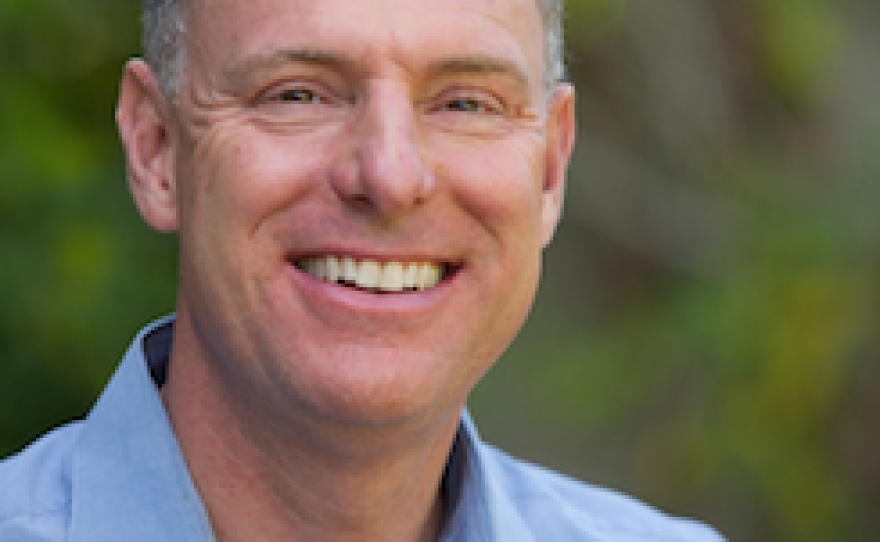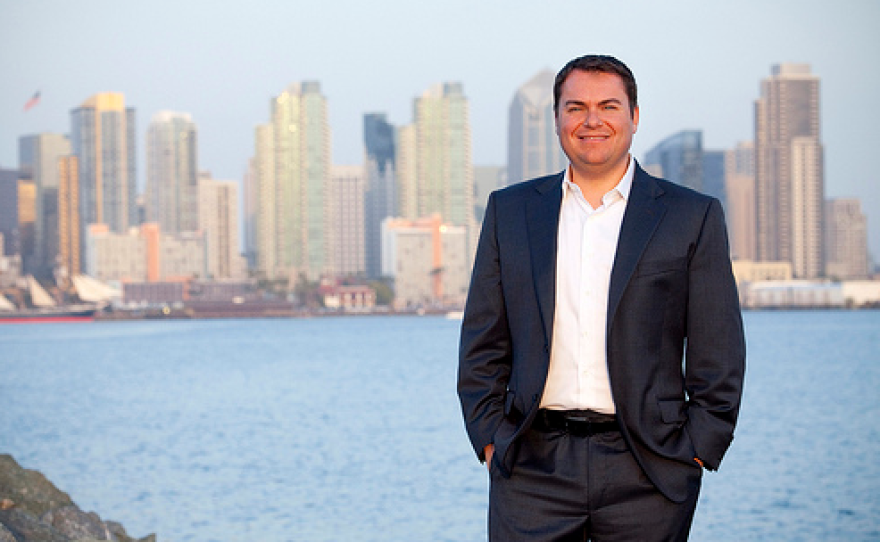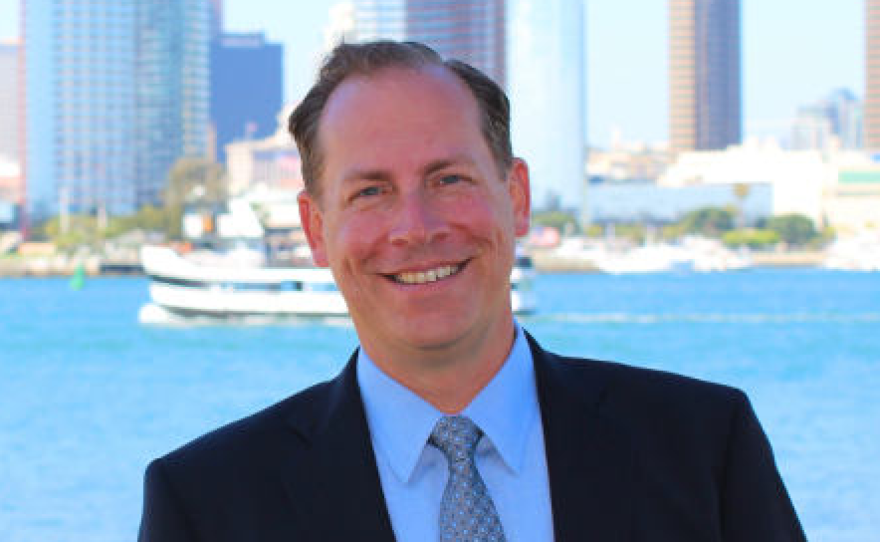This story has been updated. See note below the story for details.
Only seven of the 435 congressional seats this year are rated a "pure toss up" by the nonpartisan Rothenberg Political Report. One of them is in San Diego.
In the 52nd District, one-term Democratic Congressman Scott Peters is challenged by three Republicans: former San Diego Councilman Carl DeMaio, former Marine officer Kirk Jorgensen and surgeon Fred Simon.
The top two vote-getters in the June 3 primary will advance to a November runoff. In California's open primary system, approved by voters in 2010, the two candidates with the most votes advance to the general election, regardless of their party. So while Peters is expected to face a Republican, likely DeMaio, it's possible that two Republicans could face each other in November.
Because the race is one of the few nail biters in this year's midterm elections, it's attracting a lot of money and attention. Last week, President Barack Obama came to San Diego to raise money for the Democratic Congressional Campaign Committee, which supports Peters, while DeMaio was recently interviewed nationally on Fox News.
Three of the four candidates have so far raised more than $1 million: Peters has $1,847,775; DeMaio has $1,608,926; and Simon has $1,382,008, although $1,353,000 is money Simon loaned himself. Jorgensen has $277,696.
And it's only the primary. As we head to November, even more money, including spending from outside political action committees, will pour in, said San Diego Mesa College politics professor Carl Luna.
"This is getting national attention. The Koch brothers have been putting money in through their Super PAC. The National Democratic Committee is putting money in," Luna said. "When you only have a half dozen or so really competitive races, it's going to attract attention, and it's kind of a signpost for (whether) Republicans stay competitive in a shifting California."
The district's voter registration is split: 33.8 percent are Republicans, 32.3 percent are Democrats and 28.7 percent are independent.
The district's boundaries were sharply shifted by 2010 redistricting. It now runs north from Coronado to La Jolla, and then east to include Carmel Valley, Scripps Ranch, Poway and Rancho Bernardo. It's 69 percent white and 20 percent Asian, and 56 percent of district residents have a bachelor's degree, according to 2011 Census data.
In 2012, Republican Congressman Brian Bilbray, who had previously represented the 50th District, ran against Peters in the 52nd. The hotly contested race ultimately went to Peters, but it was close. Peters won by just under 7,000 votes.
The toss-up rating isn't the only thing that makes the 52nd race interesting. The candidates are a diverse group. Here's a quick run-down:
Scott Peters

La Jolla resident Peters, 55, worked as an environmental lawyer and then served on the San Diego City Council from 2000 to 2008. He then became a commissioner at the Port of San Diego and was elected to Congress in 2012.
He serves on the Armed Services and Science, Space, & Technology committees in the House.
Peters said he's focused his work in Congress on things that help San Diego.
"So part of that is supporting the innovation economy and the job creation there, part of it is clean technology and the third part is veterans," he told KPBS.
Peters has sponsored bills to improve housing for elderly homeless veterans and to provide grants for infrastructure improvements at border crossings. He's also working with the Military Transition Support Project to help people as they leave military service.
Peters said he works well with San Diego's other congressional representatives, both Democrats and Republicans. One example, he said, is the $226 million for border infrastructure funding included in the most recent federal budget.
"Most people who've seen the five of us working together don't remember a time when our delegation has been as cooperative and collaborative and productive as it is now," he said. "That's largely a factor of having people who want to work together, who put the country and San Diego before party. "
Carl DeMaio

Rancho Bernardo resident DeMaio, 39, ran The Performance Institute and the American Strategic Management Institute, for-profit businesses that train government workers and corporate leaders on efficiency and financial practices. He was elected to San Diego's City Council in 2008.
In 2012, DeMaio ran for mayor but lost to then-Congressman Bob Filner by 5 percentage points. Less than a year later, Filner resigned as mayor over sexual harassment allegations.
While DeMaio had already announced he'd run for Congress, he hinted he was considering running for mayor again in San Diego's special election last year. Voice of San Diego reported that Republican leaders told DeMaio they would support now-Mayor Kevin Faulconer (then a councilman) over him. DeMaio ultimately decided to stick with his congressional run.
His campaign is focusing on fiscal discipline, including his "Fix Congress First" plan, which would require all legislative language be posted online for 72 hours before a vote, eliminate the congressional pension program and take away congressional salaries if a budget isn't passed.
DeMaio also calls himself a "New Generation Republican" who wants the GOP to focus on fiscal, not social, conservatism. DeMaio is gay and made an online campaign ad that shows him and his partner Johnathan Hale holding hands and marching in a gay pride parade.
DeMaio's campaign did not respond to interview requests for this story. On Fox News, he called out San Diego's LGBT groups for attacking him.
"I've found more tolerance, acceptance and inclusion from social conservative groups who have to reconcile that I'm a Republican who happens to be gay ... versus the intolerance the LGBT leaders see me as a gay man who happens to be a Republican," he said.
Kirk Jorgensen

Black Mountain Ranch resident Jorgensen, 43, has never run for office. The Republican served in the Marines for 10 years and says if elected, he'd be the "only CIA officer serving in Congress." Jorgensen received a CIA Operations Officer certification and then served with the Defense Intelligence Agency, according to his campaign website bio. After leaving the Marines, he began work at the military consulting firm Booz Allen Hamilton.
Jorgensen told KPBS he was looking for a campaign to volunteer with, but couldn’t find any that shared his values, so he ran himself.
"I'm tired of seeing the same names on the ballot year after year, and thinking that something's going to change," he said. "I decided to enter the race to be a servant leader and a citizen legislator. I'm the only candidate who's taken a term limit pledge. If elected, I'll be the 52nd's employee for no more than six years."
His campaign is focusing on repealing Obama's health care law, simplifying the tax code to make sure "American corporate tax rates encourage job creation and allow us to compete in the global marketplace" and protecting the Second Amendment.
Jorgensen said the national debt is "the biggest thing that keeps me up at night." If elected, he said he'd work with both parties on the issue by removing outdated and unnecessary business regulations.
"I'd look for both Democrats and Republicans who care about the issue," he said. "We'd sit in a room and start tearing up regulations we agree on that don't need to be there."
Fred Simon

Coronado resident Simon, 61, also has never run for office. A Republican, he works as a surgeon at Scripps Memorial Hospital Encinitas and has been a doctor for 33 years.
He told KPBS he felt called to run because he thinks the other candidates are lacking qualifications and he's worried about the future of the country.
"When you look at it from the standpoint of the four people in this race, I'm by far more experienced at private sector issues of finance, business, health care, education," he said. "So I said, OK, I've got these kids, I've got this experience, I'm 61 years old, I've got lots of energy, I've got the support of my family, and I've got to make American better."
Simon has loaned his campaign $1,353,000, money he said he earned by working 100 hours a week for 20 years. He said his ability to spend his own money, combined with his education and work experience, make him the type of congressman imagined by the founding fathers.
"Our government was meant to be run by educated people, which all of the founding fathers were, and it was to educate the population, not de-educate them so you had a bunch of people who didn't recognize or understand the issues, and it was supposed to be limited power in a short period of time that people serve in the government, and it's just the opposite of all of that," he said. "I can send a message untainted by special interests and the Washington elite, and that's why I got in this race."
Simon's campaign is focusing on education and health care. He wants to limit federal expansion into the education system, create more vocational schools to provide job training and opposes Obama's health care law.
As the June primary approaches, Simon and Jorgensen especially are spending on advertising. But the majority of money and advertising likely will come as the race between the top two candidates heads to November.






